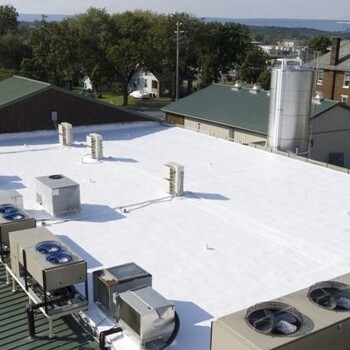
The Ultimate Guide to Flat Roof Repair
Flat roofs are a popular choice for commercial buildings and some residential properties due to their modern look and practical benefits. However, maintaining and repairing them requires specific knowledge and techniques. In this comprehensive guide, we’ll answer some of the most common questions about flat roof repair to help you keep your roof in top condition.
What is the Best Way to Fix a Flat Roof?
Fixing a flat roof involves several steps, depending on the extent of the damage. Here’s a step-by-step guide:
- Inspection: Start by thoroughly inspecting your flat roof for any signs of damage such as cracks, blisters, or punctures. Pay close attention to seams, flashings, and areas around roof penetrations.
- Cleaning: Clean the affected area to remove any debris, dirt, or loose materials. This ensures that the repair materials will adhere properly to the roof surface.
- Preparation: Cut away any damaged or loose material around the affected area. For larger areas, you may need to remove the old roofing material and replace it with new material.
- Application of Roofing Cement: Apply a generous amount of roofing cement to the damaged area. Spread it evenly with a trowel to cover the entire area.
- Patching: Cut a piece of roofing felt or patch material that is slightly larger than the damaged area. Press it firmly into the roofing cement and smooth it out to remove any air bubbles.
- Sealing: Apply another layer of roofing cement over the patch and feather the edges to ensure a seamless seal. For added protection, you can apply a layer of roof coating over the repaired area.
Why Does My Flat Roof Leak After a Heavy Rain?
Leaking after heavy rain is a common issue for flat roofs and can be caused by several factors:
- Poor Drainage: Flat roofs must have proper drainage systems to channel water away from the roof surface. Clogged or inadequate drains can lead to water pooling and eventually leaking.
- Damaged Membrane: The roofing membrane is a waterproof layer that protects your roof. Over time, it can become damaged due to UV exposure, foot traffic, or weathering, leading to leaks.
- Flashing Failures: Flashing is used to seal the edges of the roof and around roof penetrations. Damaged or improperly installed flashing can allow water to seep into the roof structure.
- Seam Issues: Seams are the weakest points on a flat roof. If they are not properly sealed or become damaged, water can easily penetrate the roof.
How Do You Fix a Puddle on a Flat Roof?
Puddles, or ponding water, can cause significant damage to a flat roof if not addressed promptly. Here’s how to fix it:
- Identify Low Spots: Inspect the roof to locate low spots where water tends to accumulate. These areas need to be leveled to prevent ponding.
- Add Tapered Insulation: Tapered insulation can be installed to create a slight slope, directing water towards drains. This is a common and effective solution for ponding water.
- Install Additional Drains: Adding more drains or improving the existing drainage system can help manage water more effectively and prevent puddles.
- Roof Coating: Applying a high-quality roof coating can help to seal minor depressions and create a smoother surface that prevents water accumulation.
Does Flex Seal Work on Flat Roofs?
Flex Seal is a popular product for sealing leaks and small cracks. Here’s what you need to know about using it on flat roofs:
- Temporary Solution: Flex Seal can provide a temporary fix for small leaks and cracks. It’s easy to apply and can be effective for minor repairs.
- Not a Permanent Fix: For long-term flat roof repair, more durable materials like roofing cement and patches are recommended. Flex Seal may not withstand the harsh weather conditions and foot traffic that flat roofs are exposed to.
- Application Tips: If you choose to use Flex Seal, make sure the area is clean and dry before application. Apply multiple coats for better coverage and protection.
Conclusion
Maintaining a flat roof requires regular inspections and prompt repairs to address any issues before they become major problems. Whether you’re dealing with leaks, puddles, or general wear and tear, understanding the best methods for flat roof repair can help you extend the life of your roof and protect your property.
If you’re experiencing issues with your flat roof, don’t hesitate to contact our expert team for professional flat roof repair services in Dallas, TX. We have the experience and expertise to handle all your roofing needs and ensure your roof remains in excellent condition.
Ready to get your flat roof back in top shape? Contact us today at 214-373-1500 for a free inspection and quote. Our experienced roofing professionals are here to provide you with reliable and efficient flat roof repair solutions. Don’t wait—protect your property and extend the life of your roof with our expert services!
